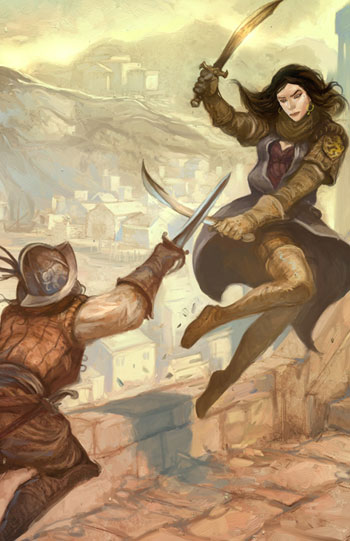Martial Exploits - Trip, Disarm, and Sunder

While most combatants have a firm grasp on the basics of combat - keep your feet on the ground, hold on to your gear, swing at the other guy - down solidly, accidents happen. Sometimes, the only thing separates victory from defeat is a single minor slip-up. Especially if your opponent is able to capitalize on it...
This system integrates cleanly into the 4E D&D combat system, by providing four new maneuvers - which are nothing more than powers that everyone may use - that allow combatants to take advantage of their enemies' mistakes. Mistakes that are represented by a new condition, unbalanced.
Being Unbalanced
A character who is unbalanced is a little slower to react, and a little slower on the offensive, as well. Perhaps he's standing on a floor covered in oil and attempting to keep his footing, or perhaps he's recovering from a blow that nearly caught him, but still managed to throw him back a moment.
Unbalanced
- The creature can’t take immediate actions or opportunity actions.
- The creature can’t flank.
A character who is unbalanced can spend a minor action to regain his composure, removing the condition.
Becoming Unbalanced
A character is unbalanced if he rolls a natural 1, "fumbles", on an attack roll. If a character makes multiple attack rolls as part of a single attack (for instance, if he is attacking an area,) only a natural 1 on the first roll can cause him to become unbalanced.
A character may also become unbalanced as a result of powers or maneuvers used against him.
Exploiting Unbalanced
Maneuvers are the primary addition of this system. A maneuver is, at its heart, a standard power, as any other. The distinguishing characteristic of maneuvers is that they are usable - or known, if you prefer - by anyone, being nothing more than another form of combat action. A charge could be considered a maneuver, for instance.
Feats
Several feats extend the capabilities of the maneuver system.
Tricky Combatant
You have learned to work maneuvers into the brief moments of opportunity you have when an opponent lowers his guard.
Benefit: You can use Disarm, Trip, and Minor Feint as melee basic attacks. In addition, you can use minor feint as a free action after making an attack.
Ranged Trickster
You don't need to get in close to throw someone off.
Benefit: You can use Disarm, Trip, and Minor Feint with a ranged weapon or an implement. If you use a ranged weapon, they use that weapon's range. If you use an implement, you gain a +2 bonus to the attack and it gains Ranged 10.
Disarm
Maneuver
Taking advantage of your foe's temporary distraction, you attempt to wrest away his sword.
At-Will
Martial, Weapon
Standard Action
Melee weapon
Target One unbalanced creature
Attack Primary vs. Fortitude
Hit: One object held by the target is dropped; it falls 1d4 squares away from the target, in a direction of your choice.
Sunder
Maneuver
Sometimes, taking away your opponent's tools is the surest way to victory... and right now, he's not expecting it.
At-Will
Martial, Weapon
Free Action
Melee weapon
Trigger You attack an unbalanced creature
Target The target of the triggering attack
Attack Primary vs. Fortitude
Hit: You take a -2 penalty and are weakened for the triggering attack, but you strike your target's carried weapon, implement, shield, or worn armor. If you choose to strike a weapon or implement, all attacks made using it suffer a -1 penalty until it is repaired. If you strike armor or a shield, the bonus provided by that piece is reduced by 1 until repaired.
Trip
Maneuver
While your enemy attempts to regain his guard, you swing for his feet.
At-Will
Martial, Weapon
Move Action
Melee weapon
Target One unbalanced creature
Attack Primary vs. Reflex
Hit: The target falls prone.
Minor Feint
Maneuver
You make an attack with no intent to follow through, solely to throw your opponent off-balance.
Encounter
Martial, Weapon
Minor Action
Melee weapon
Target One creature you just hit
Attack Primary vs. Will
Hit: The target is unbalanced until the end of your next turn.